
by Gardens of Babylon | Apr 8, 2025
–
Spring has officially sprung, which means warmer weather, longer days, and more time in the garden! What’s the next step for your landscaping? Need some landscaping tips? Check out these easy ways to get your yard in shape:

- Re-seed the damaged or bare areas of the lawn: If your lawn has areas that are damaged or bare, it’s essential to reseed them to promote healthy grass growth and maintain an even appearance. Start by preparing the soil in these areas by loosening it with a rake or garden fork. Then, spread grass seed evenly over the prepared soil, making sure to choose a seed variety appropriate for your climate and soil conditions. Lightly rake the seed into the soil, water thoroughly, and keep the area consistently moist until the new grass establishes itself.
- Mow established cool-season turf grasses weekly or as needed; raise mower height to three to four inches: Regular mowing is crucial for maintaining healthy turf grass. For cool-season grasses, such as fescue or Kentucky bluegrass, mow weekly or as needed to keep the lawn at an optimal height of three to four inches. Adjusting your mower height helps promote deeper root growth and improves the lawn’s ability to withstand drought and stress.
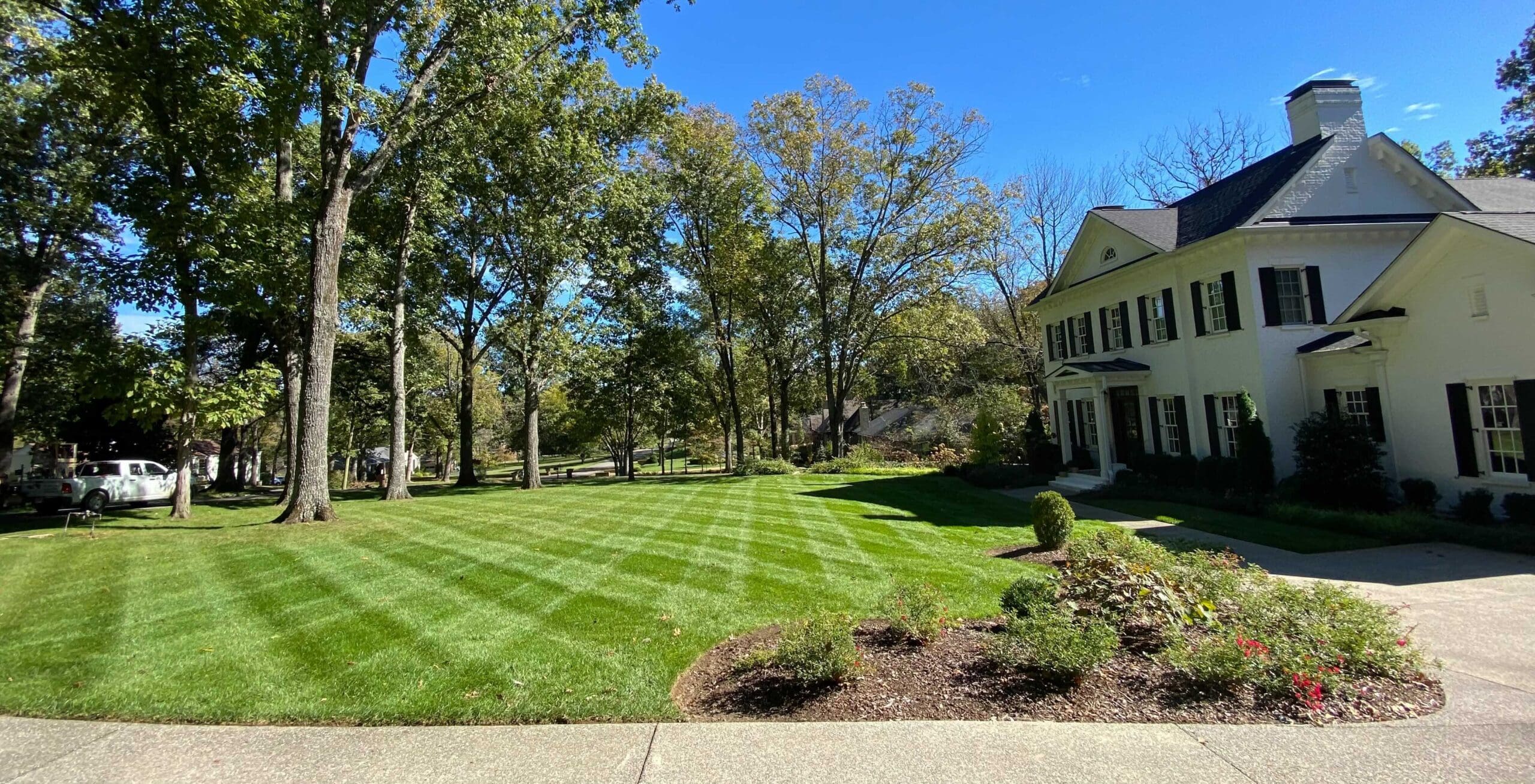
- Contact us for a quote on lawn care. We can help by first completing a soil test to find out the actual composition of your soil: If you’re unsure about the condition of your lawn or need assistance in improving its health, consider reaching out to us for professional lawn care services. We can start by conducting a soil test to assess the pH level and nutrient content of your soil. This information allows us to tailor a lawn care plan specific to your lawn’s needs, ensuring optimal growth and vitality.
- Replace or refresh mulch around plants: Mulch plays a vital role in conserving soil moisture, suppressing weeds, and insulating plant roots. If your existing mulch has begun to break down or thin out, it’s time to replace or refresh it. Remove any old mulch and weeds from around your plants, then apply a fresh layer of mulch to maintain a depth of two to four inches. Choose a mulch material that complements your landscape and provides the benefits your plants need.

- Prune spring-blooming shrubs and vines after they finish flowering: Proper pruning is essential for maintaining the health and appearance of spring-blooming shrubs and vines. Wait until after they finish flowering to prune, as this allows you to enjoy their blooms and ensures they have ample time to set buds for next year. Remove any dead or damaged branches, as well as any crossed or crowded growth, to promote better air circulation and overall plant health. If you would like our help, our team can do a seasonal clean-up for you!
- Plant ground covers and warm-season annuals and perennials as soil temperatures warm and the danger of frost has passed: As spring progresses and soil temperatures rise, it’s time to plant ground covers, warm-season annuals, and perennials in your garden beds and borders. Choose plants that thrive in your local climate and soil conditions, and be mindful of the last frost date in your area to avoid any potential damage to tender plants. You can find all your gardening needs at our garden center!
- Check roses, ornamentals, and vegetables for powdery mildew, prevalent in mild, moist spring weather: Powdery mildew is a common fungal disease that can affect roses, ornamental plants, and vegetables, especially in mild, moist spring weather. Keep an eye out for white, powdery spots on the leaves and stems of your plants, as well as any distorted growth or yellowing foliage. If you notice signs of powdery mildew, promptly remove and dispose of affected plant parts, and consider applying a fungicidal treatment to prevent further spread.
- Check new growth on ornamental plants weekly for aphids and scale insects and treat with a natural pesticide, if necessary: New growth on ornamental plants is particularly vulnerable to infestations of aphids and scale insects, which can quickly multiply and damage your plants. Inspect your plants regularly for signs of these pests, such as clusters of small, soft-bodied insects or sticky, honeydew-like residue. If necessary, treat affected plants with a natural pesticide to control the infestation and protect your plants’ health.
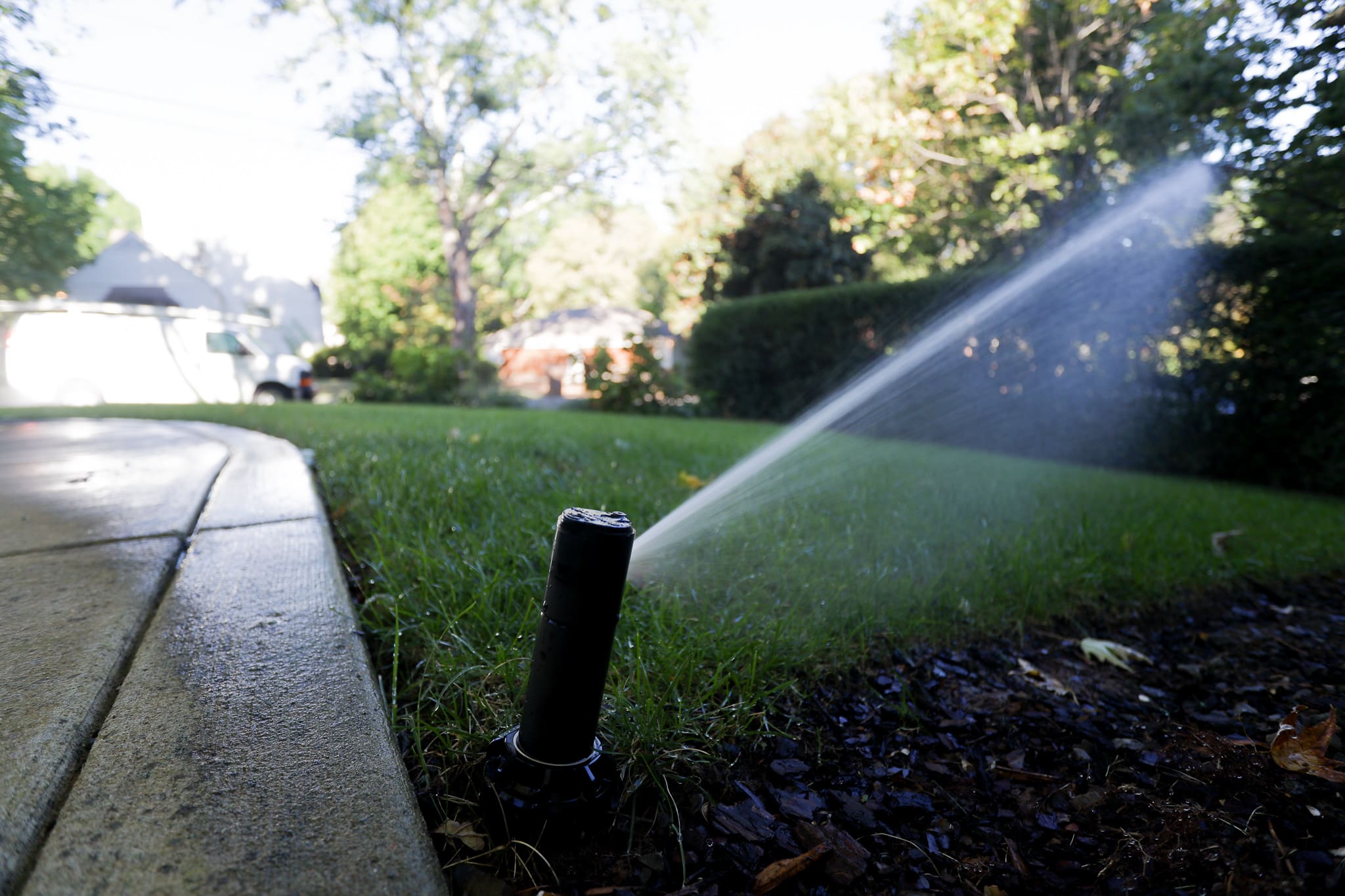
- Water all your plants when they’re dry, but be particularly diligent with new plantings that can quickly dry out in our persistent spring winds: Adequate water is essential for the health and vitality of your plants, especially during the dry spring months. Water your plants deeply and thoroughly when the soil is dry to the touch, ensuring that water reaches the root zone where it’s needed most. Pay special attention to new plantings, which may be more susceptible to drying out in windy conditions. Consider using mulch to help retain soil moisture and reduce water evaporation.
- Start up and test your irrigation system: Before the heat of summer sets in, it’s important to start up and test your irrigation system to ensure it’s functioning properly. Check for any leaks, clogs, or damaged components, and make any necessary repairs or adjustments. Adjust your irrigation schedule as needed to provide adequate water to your plants while minimizing waste. Regular maintenance of your irrigation system helps ensure efficient water usage and promotes healthy plant growth throughout the growing season.
Hopefully these landscaping tips were helpful to get you started this spring. To begin your next project, schedule a phone consultation! We would love to work with you on bringing your vision to a reality. If you would like to work with your existing designer, simply fill in their name in the “Project Details” section.

by Gardens of Babylon | Apr 7, 2025
Spring is all around us, from the blooming redbuds and chocolate chip ajuga (my personal favorite) alongside the cheerful melodies of nesting birds. Let’s bid farewell to winter’s starkness and bring some charm and color to that porch! Stepping into the lively season of spring is easier than you think with the right combination of plants, pots, and process of crafting it. Let’s explore the essentials to help you create a botanical wonder, that elevates your outdoor space and inspires your neighbors!
Plants: Blooms with Color
To create a captivating container garden that flourishes in the Middle Tennessee climate, it’s essential to select plants that not only tolerate but thrive in our conditions. Here are some delightful spring-flowering plant options:
Pansies (Viola × wittrockiana)
Bloom Time: Pansies typically bloom from early spring until the heat of summer.
Colors: Pansies come in a wide array of colors, including purple, yellow, orange, and blue.
Cool Fact: Pansies are not just pretty faces – they’re edible too! These charming blooms are often used to garnish salads or desserts, adding a pop of color and a subtle floral flavor.
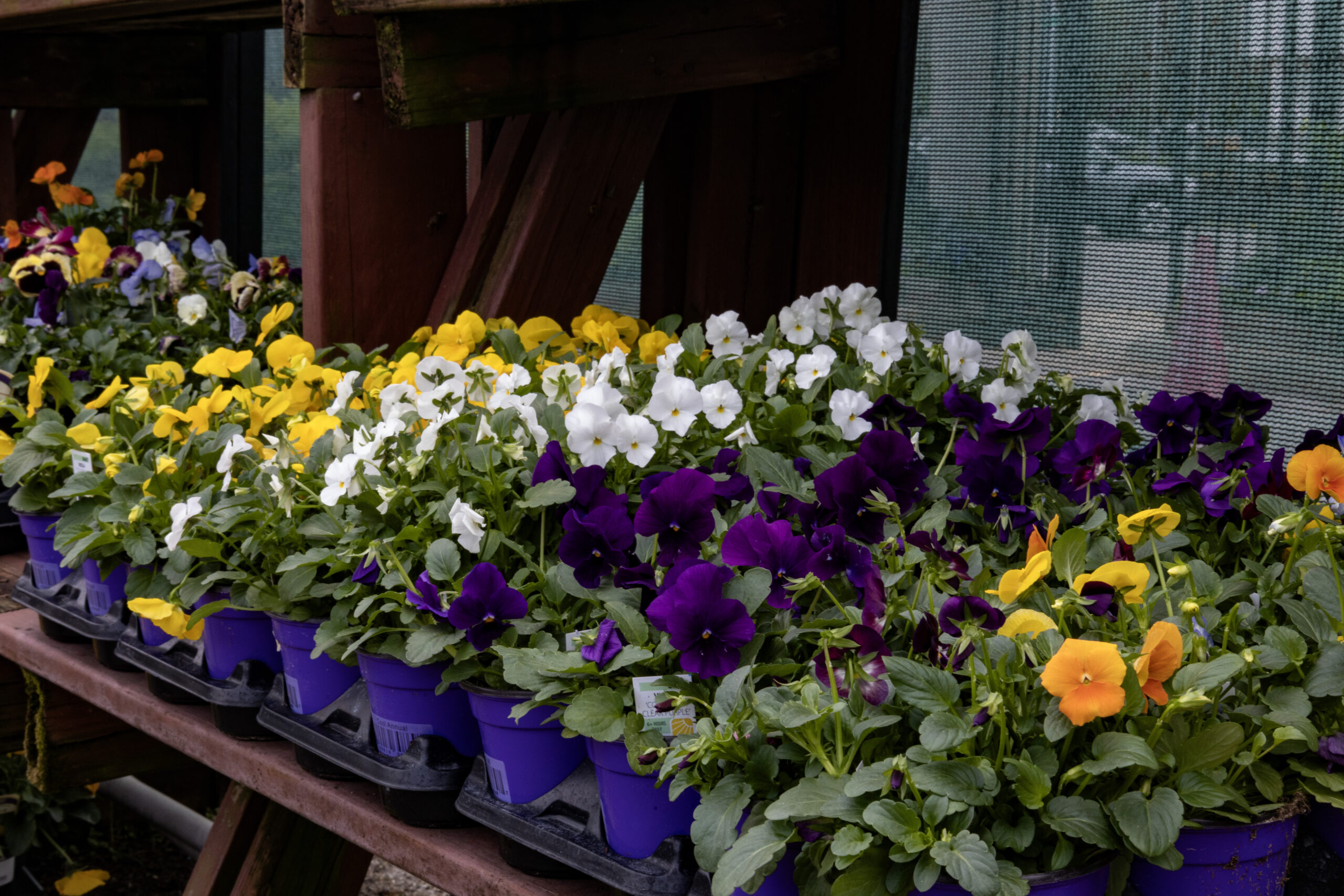
Snapdragons (Antirrhinum majus)
Bloom Time: Snapdragons bloom from late spring to early summer.
Colors: Snapdragons are available in an assortment of hues, including pink, red, yellow, white, and purple.
Unusual Fact: The name “snapdragon” comes from the flower’s unique appearance. When you gently squeeze the sides of the bloom, it opens its “mouth” like a dragon’s, revealing a tongue-like structure inside.
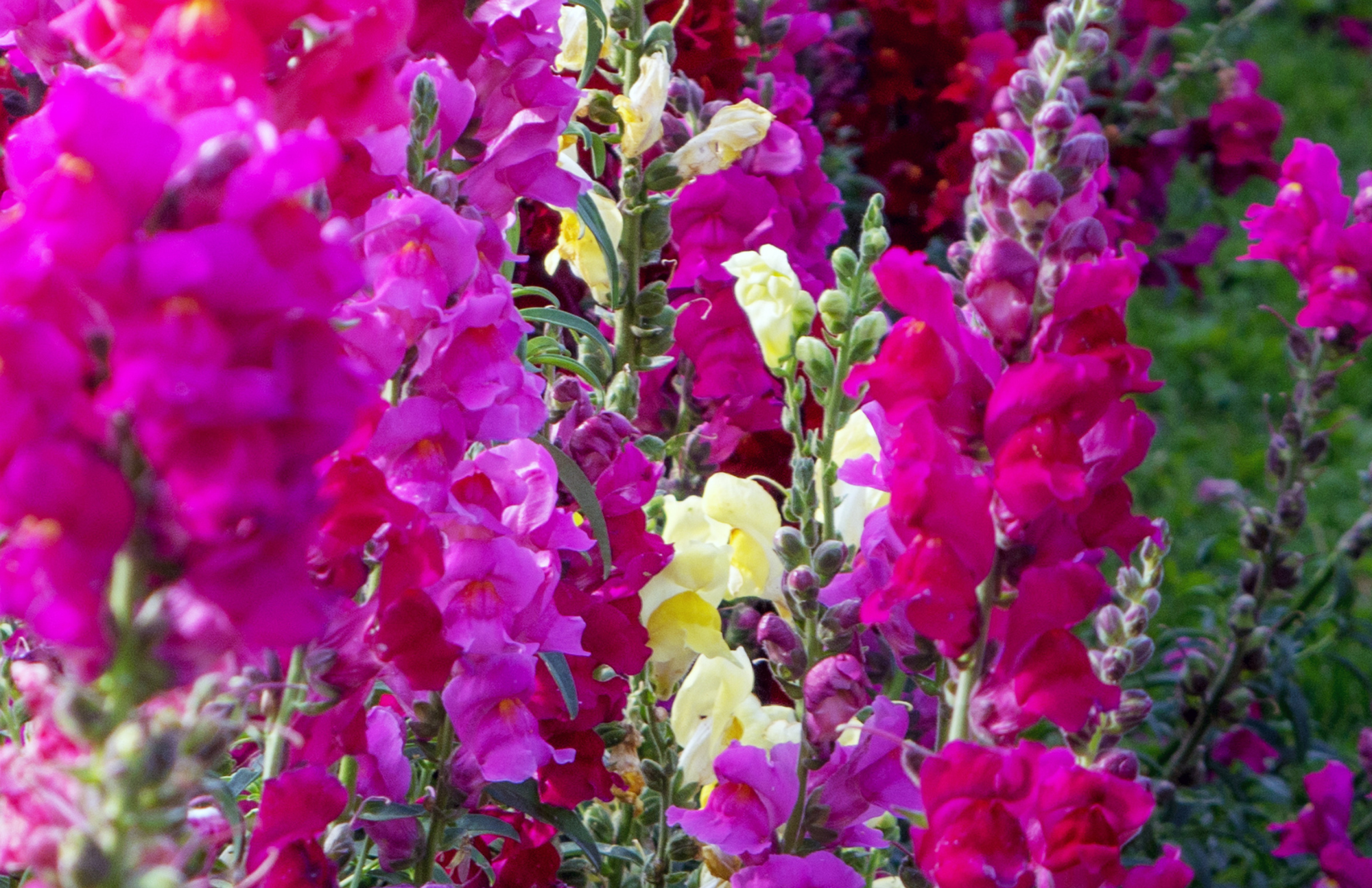
Petunias (Petunia × hybrida)
Bloom Time: Petunias bloom profusely from spring until the first frost in fall.
Colors: Petunias showcase a vibrant spectrum of colors, from bold reds and pinks to soft pastels and striking purples.
Fun Fact: Petunias are popular for their ability to attract hummingbirds with their brightly colored blooms and sweet nectar. These delightful visitors add an extra touch of magic to your garden.
Chocolate Chip Ajuga (Ajuga reptans ‘Chocolate Chip’)
Bloom Time: Chocolate Chip Ajuga blesses us with its blooms from late spring to early summer, gracing the garden with its charming presence.
Colors: Its flowers display a range of hues from delicate lavender to deep purple, complementing the rich chocolate tones of its foliage.
Interesting Fact: Beyond its visual appeal, Chocolate Chip Ajuga offers more than meets the eye. Its leaves emit a subtle fragrance when brushed, adding a delightful sensory dimension to the garden. Moreover, like lavender, it holds potential for herbal remedies, contributing both beauty and practicality to your outdoor space.
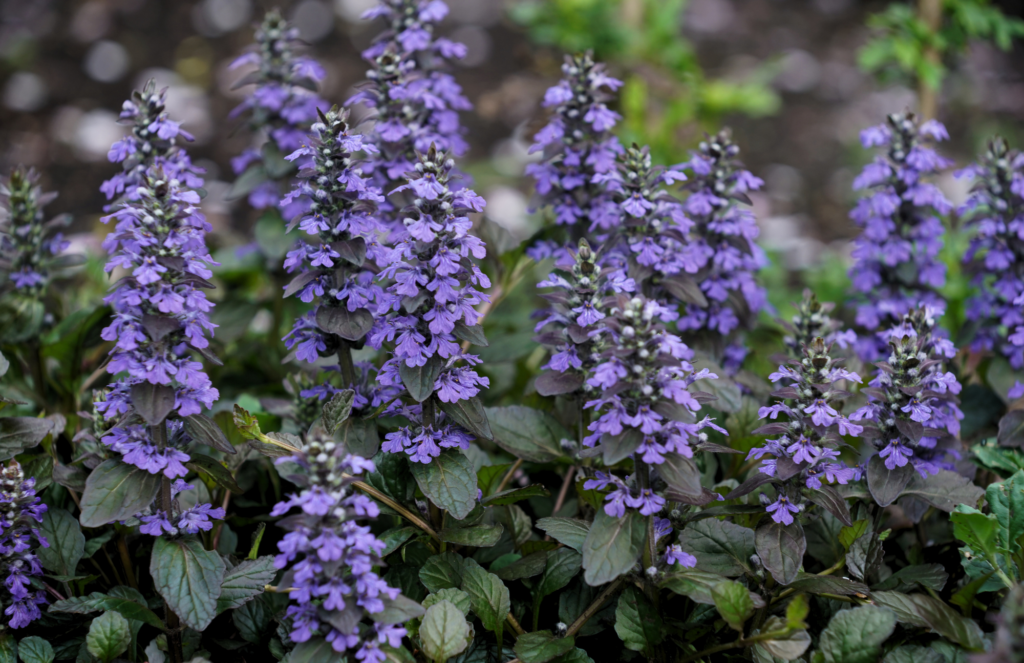
Dianthus (Dianthus spp.)
Bloom Time: Dianthus blooms from late spring to midsummer.
Colors: Dianthus blooms come in an array of colors, including pink, red, white, purple, and bicolor combinations.
Fabulous Fact: The name “dianthus” is derived from the Greek words “dios,” meaning divine, and “anthos,” meaning flower. These charming flowers have been cherished for centuries for their delicate beauty and delightful fragrance.
Pots: Elevating Your Style
When it comes to selecting pots for your container garden, form doesn’t always follow function. For instance, French country pots often feature rustic charm with distressed finishes and intricate detailing, perfect for adding a touch of vintage elegance to your porch. A great example would be this lovely Bergs pot. On the other hand, modern pots boast clean lines and minimalist designs, ideal for creating a sleek contemporary look. At our garden center, we offer a wide selection of pots in store and online here in various styles to suit your taste and elevate your outdoor decor.
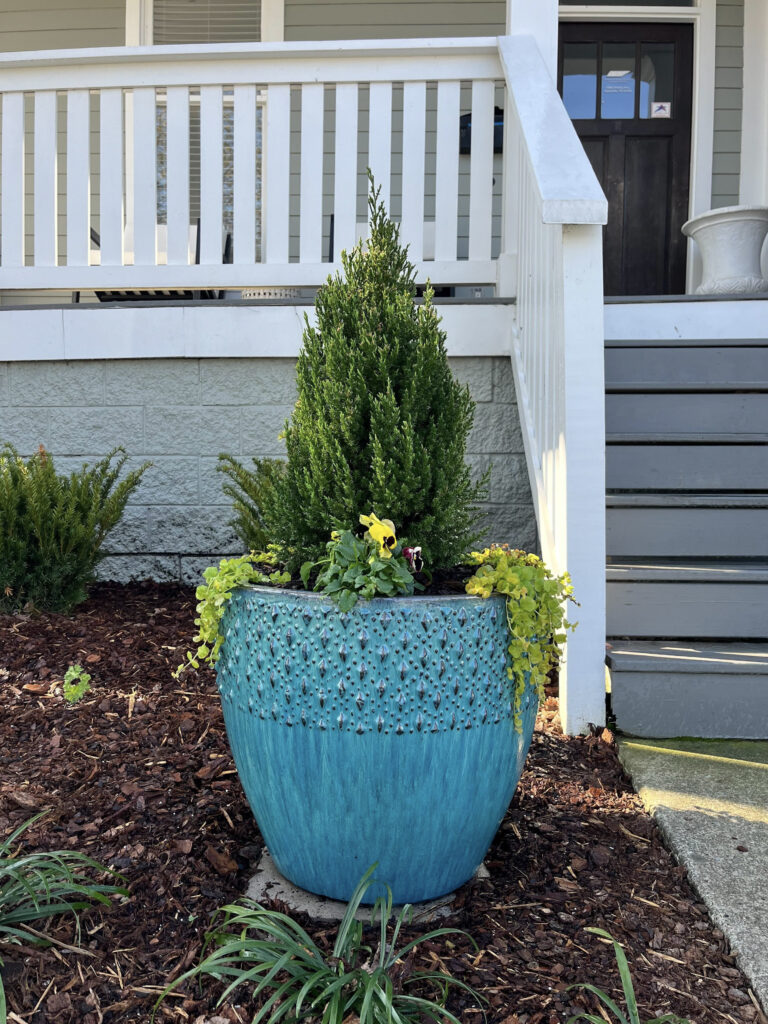
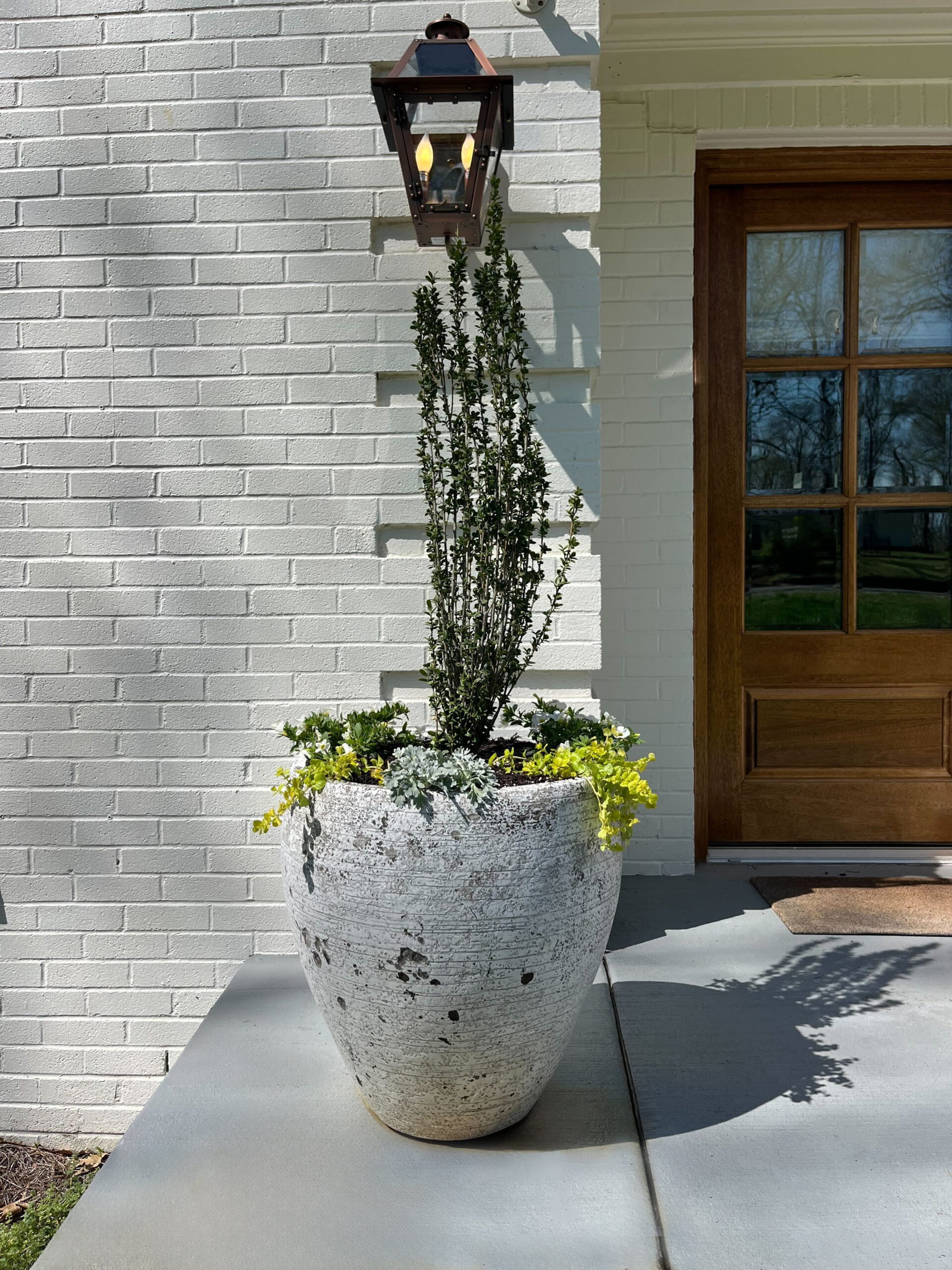
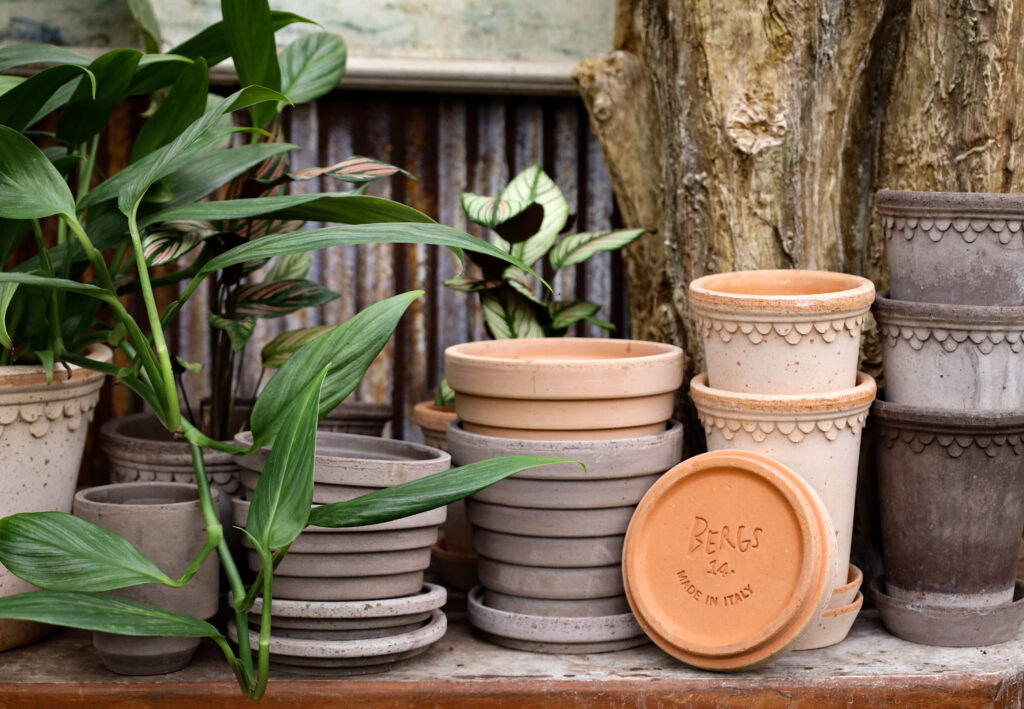
Process: Crafting Your Botanical Ensemble
Creating a successful container garden is all about balance and composition, and the “thriller, filler, spiller” technique offers a foolproof formula for achieving stunning results. The “thriller” plant serves as the focal point, adding height and drama to your arrangement. This could be a tall grass like Miscanthus or a striking spike plant such as Dracaena. The “filler” plants, positioned around the thriller, add volume and color, filling in the space between the taller centerpiece and the trailing spillers. Choose plants with contrasting textures and complementary hues to create visual interest. Finally, the “spiller” plants cascade over the edges of the container, softening its edges and adding a sense of movement. Trailing petunias, ivy, and sweet potato vine are excellent choices for spillers.
But don’t forget about soil in our containers. That’s something that most people overlook – they get caught up with the beauty of the flowers. But, actually, the soil is the most important component, because that’s what’s going to feed our beautiful plants and give them nutrients. You want to get the best quality potting soil that you can for your containers with lots of micronutrients. We have great quality soil and different brands to choose from at Gardens of Babylon!
Pro tip: If you have pots that dry out throughout the day, buy some play sand to place in bottom of your containers and this will hold more moisture for you throughout the season!
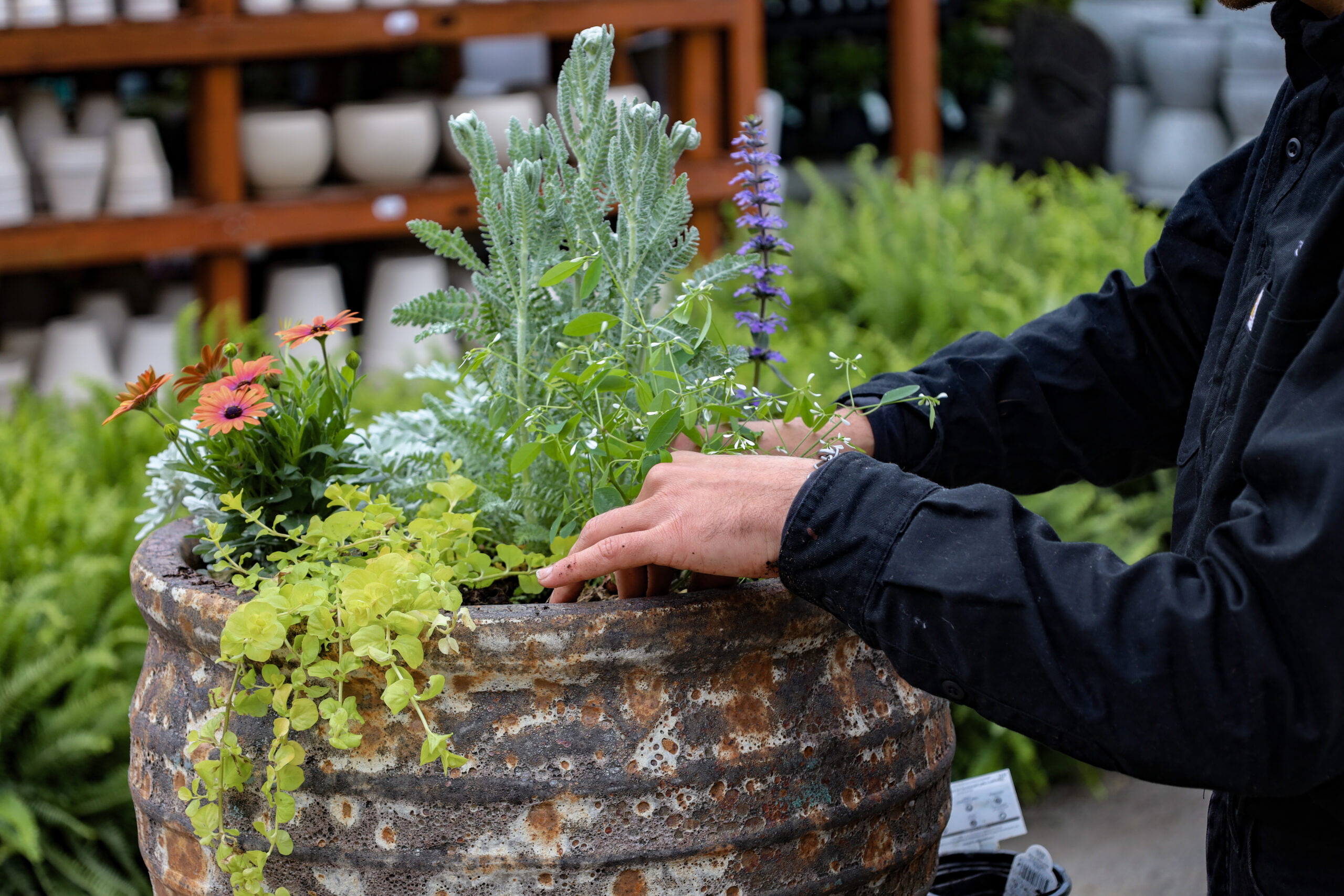
Ready to bring a splash of color to your porch? Visit the Garden Center to find the right soil, plants, and pots for your project. Our knowledgeable staff is here to help you every step of the way. And if you’re short on time or expertise, don’t hesitate to reach out to our botanical design team – we’ll handle all the work for you, from plant selection to arrangement. Let us help you turn your container garden dreams into reality!
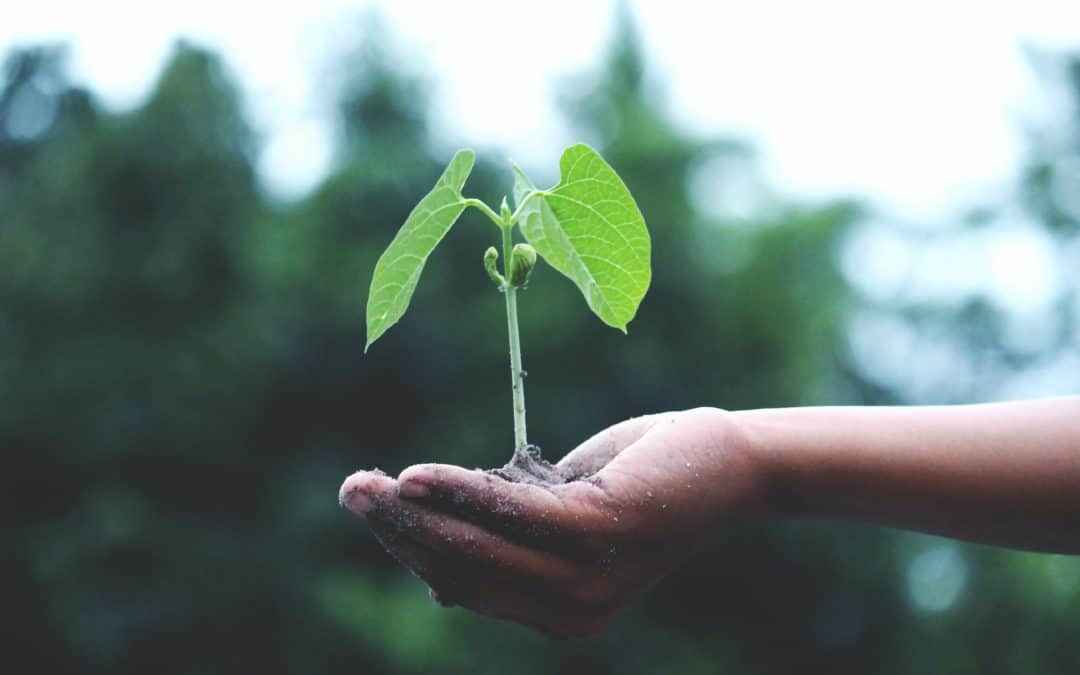
by Gardens of Babylon | Mar 5, 2025
–
Can you feel it in the air? Spring is on the way! If you plan to grow vegetables, herbs, or flowers this season, now’s the time to start planning. Starting transplants from seeds is an affordable and rewarding way to fill your garden with favorites like tomatoes, peppers, greens, zinnias, and marigolds.
When to Start Seeds Indoors
The best time to start seeds indoors depends on:
- The plant’s growth rate (check the seed packet for germination time).
- Your local last frost date (Mid-April in Middle Tennessee).
- The recommended outdoor planting time.
Here’s a quick guide for popular plants:
- Warm-season flowers & veggies (like tomatoes and zinnias) → Start seeds indoors 5–7 weeks before planting outdoors (Early to Mid-March).
- Cool-season vegetables (like lettuce, broccoli, and cauliflower) → Start 4–7 weeks before soil is workable (January to February).
- Always refer to the seed packet instructions for the best timing and specific planting guidelines.
How to Start Seeds Indoors
- Choose a Container – Use a seed-starting tray, peat pots, coir pots, or upcycled containers (milk cartons, egg crates, tin cans). Just make sure they have drainage holes!
- Use the Right Soil – Best choice: A light, well-draining seed-starting mix (or a fine-textured potting mix for houseplants like African violets). Avoid: Garden soil—it’s too heavy and may contain weeds or bacteria.
- Plant Your Seeds
- Fill your container with soil.
- Use a pencil to make shallow holes (no deeper than 4x the seed’s diameter).
- Drop in one or two seeds per section and cover lightly
- Mist the soil gently with a spray bottle to keep it evenly moist.
- Cover with clear plastic or a seed-starting lid to retain moisture.
Providing Light & Water
Watering
- Check daily! The soil should stay moist but not soggy to prevent damping off (a fungal disease that kills seedlings).
- A spray bottle is best to avoid disturbing the seeds.
Lighting
- Place trays in a bright window with plenty of natural light.
- If natural light is limited, use a grow light set on a 14–16 hour timer (positioned 6–12 inches above the seedlings).
Bonus Tip: Use a small fan to create gentle air circulation. This strengthens plant stems and reduces mold.
Transplanting & Hardening Off
As seedlings grow, they’ll need more space:
- Transplant into larger pots (peat or coir pots are great, as they can go directly into the ground).
- Hardening off: Before planting outdoors, gradually expose seedlings to outdoor conditions for a few hours each day over a week.
- Planting time: In Middle Tennessee, cool-weather crops go out in late February/March, while summer vegetables and flowers can be planted mid to late April.
What to Plant – Staff Favorites!
Flowers & Herbs:
- Sunflowers
- Zinnias
- Milkweed
- Variegated Nasturtium
- Lemon Balm
- Flower Mix Pollinator
- Basil
- Fun Pick: Cat Grass (for our shop cats, Diane & Paige!)
Starting seeds indoors is a fun and rewarding way to get a jumpstart on spring gardening. Stop by Gardens of Babylon to pick up seeds and supplies, and let’s grow something great together!

by Gardens of Babylon | Mar 1, 2025
Spring is coming up fast! Now’s the time to get cleaning! March is all about removing the old and getting ready for the new. Here’s some tips to help get you started!
- Rake the lawn, even if there are no leaves; it cleans the top layer of your lawn, allowing healthy green grass to make its way to the surface.
- Trim or mow grassy groundcovers such as liriope and Mondo grass before spring growth begins.
- Prune overgrown ground cover such as English ivy.
- Cut back ornamental grasses before new growth appears.
- Remove winter-damage from shrubs and other ornamentals.
- Apply pre-emergent fertilizer to cool-season turf grasses.
- Apply pre-emergent herbicides to your lawn at the same time to control warm season broadleaf and grassy weeds, such as dandelions and crabgrass.
- Fertilize established shade trees, ornamental trees and shrubs as spring growth begins.
- Continue to plant evergreen shrubs, fruit, nut and shade trees.
- Prune all standard roses, except climbing varieties, to 12” above the ground.
- Do not prune spring flowering shrubs and vines such as forsythia, quince, azaleas and spirea until after blooming.
- Now is also a great time to apply fertilizer and overseed/aerate your lawn! This would be an ideal time to fill in those bare spots and help jump start the turf.
To begin your next project, schedule a phone consultation
If you would like to work with your existing designer, simply fill in their name in the “Project Details” section.

by Gardens of Babylon | Feb 11, 2025
Prefer to let us bring your vision to life for you? Our designers are the best at taking small or large outdoor areas and creating beautiful spaces with them. Book here!
It can be difficult to figure out how to bring the natural beauty and benefits of plants to your home’s exterior when you feel like you don’t have the space. Creating an outdoor sanctuary in a small space demands imagination, strategic design, and a sharp eye for beauty. Whether that outdoor space you have is large or small, there are a variety of ways to elevate that area and create a personal outdoor sanctuary. Here are three things you can use to spice up your outdoor spaces, big and small:
1. Let’s start with our tried and true… potted plants!
Whether you have a large yard or a small apartment balcony, potted plants are your best friend. You can add pops of color with flowers, different decorative grasses, cascading or vining plants, and more. There’s really no limit on what you can do with a pot or multiple pots.
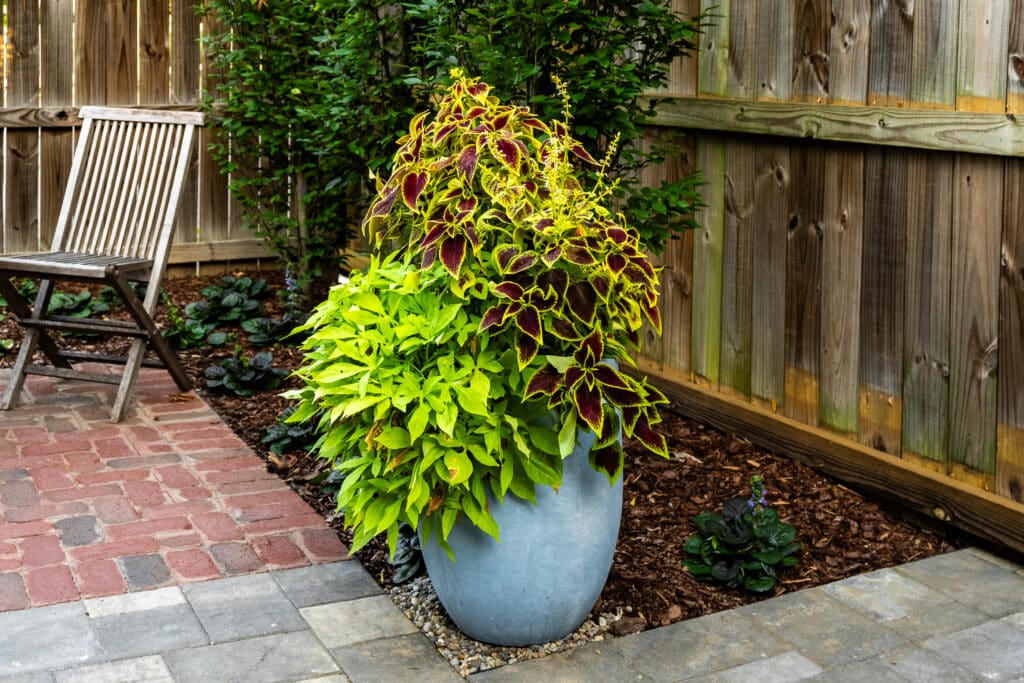
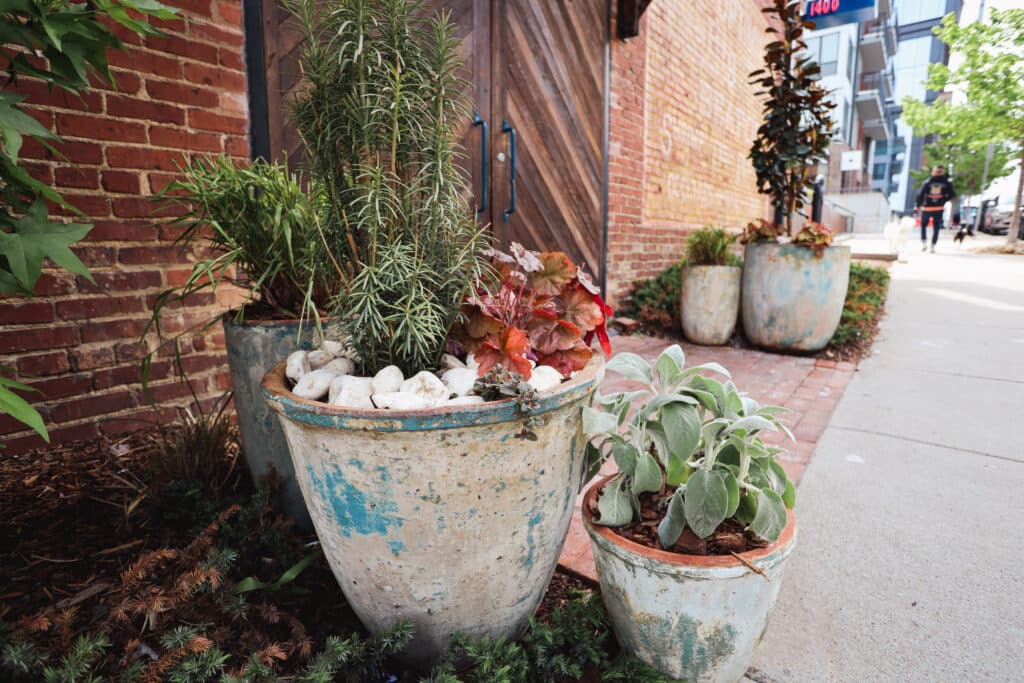
Even something as simple as a couple four-inch pots filled with herbs or leafy vegetables for cooking, placed on an outdoor table, can liven up your small balcony. Do you already have some indoor plants that would love the extra humidity and sunshine this Summer? You can bring them outdoors for the season to promote extra growth while also saving some money to decorate your outdoor living space.
If you have more space – like on a larger patio or even front door steps and walkways – you can pot small trees and place them around your space to add depth and drama. If you pick a hardier variety, you may not have to worry about them as much as other plants in the fickle Tennessee weather.
Adding pots of different sizes and colors, filled with varieties of plants, can make your limited outdoor space even more interesting. If you don’t have the space for larger pots, you could instead use plant stands to save space while still adding height and intrigue. 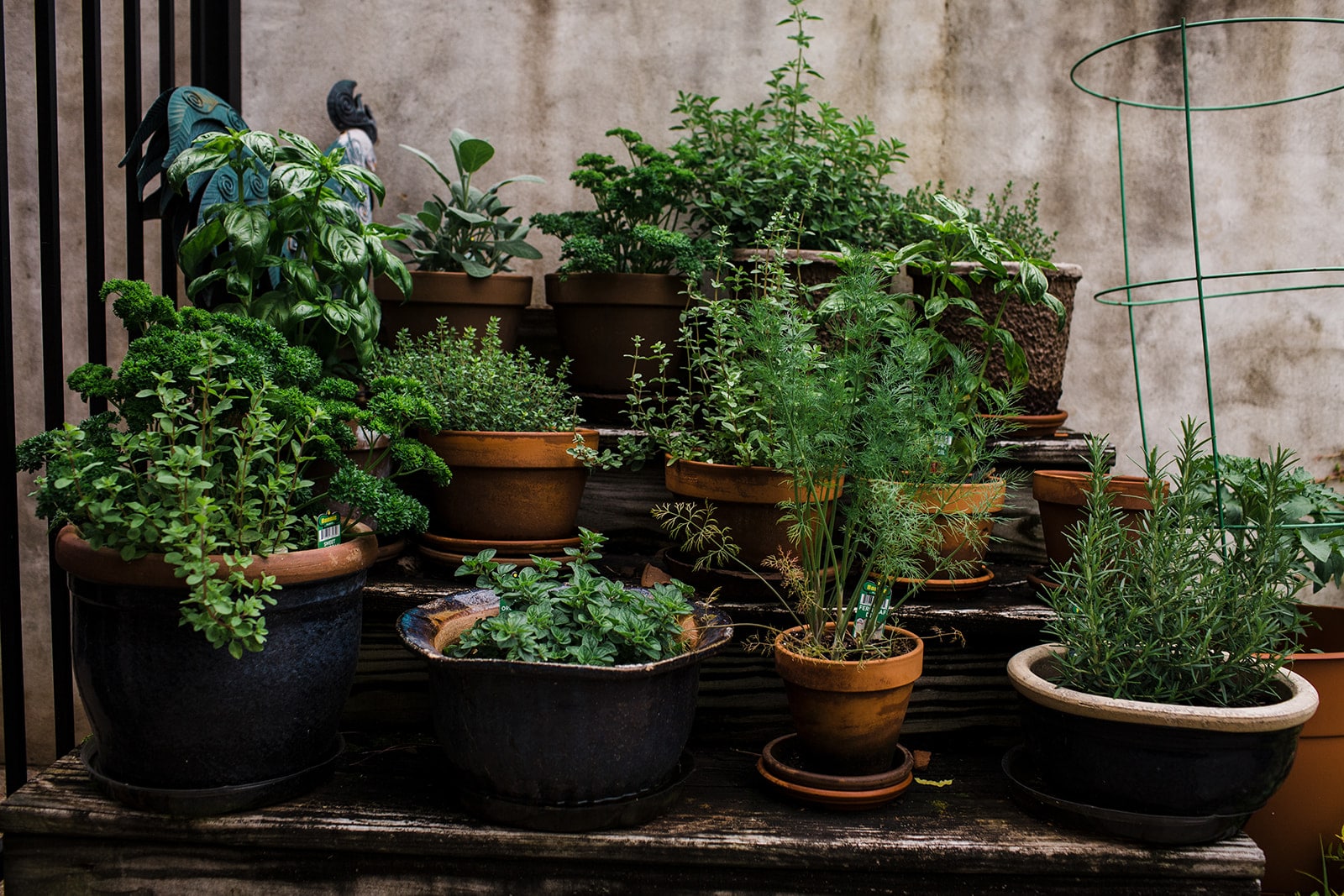
And, later in the year, when we transition to Fall, you can replace Spring and Summer varieties with mums, pumpkins and other autumnal favorites.
Some of our potted plant suggestions: When it comes to potted trees, a dwarf conifer is where it’s at. You can think of them as the little black dress of patio plants because they’re classic, go with everything, and look great year round. Rhododendrons can also be a great choice as they’re also evergreens, and they produce beautiful blooms in the Summer.
No space for a tree? We have even more suggestions for that! When it comes to low maintenance flowers, you really can’t go wrong with pansies. They’re sturdy little things that can withstand a light frost, which comes in handy when you live with the unpredictability of a middle TN Spring. Coral bells make a great leafy addition to any pot, as they come in different colors and handle temperature fluctuations well. There are also several cascading varieties, like ivies and petunias, that add even more depth to your pots.

2. Another southern favorite… hanging baskets.
Whether you’re new to Nashville or have lived in the south all your life, you’ll quickly notice the love of hanging plants here. Everything from ferns to flowers occupy these aerial beauties.
When you don’t have ground space for plants, why not look up? Hanging baskets are a great way to save space, and you don’t have to worry about the drainage of a pot. They also add drama to your outdoor spaces (but hopefully without the gossip of your too-chatty neighbor 😉).
Some of our hanging basket recommendations: There’s nothing quite as classic or simple as a fern. They’re a staple of southern homes in the late Spring and throughout Summer, and they’re great if your balcony or porch doesn’t get much sunlight. However, if you’re looking for something with more color, you can mix and match just like with potted plants. Some of our favorites include sweet potato vine, geraniums, impatiens, and snapdragons.
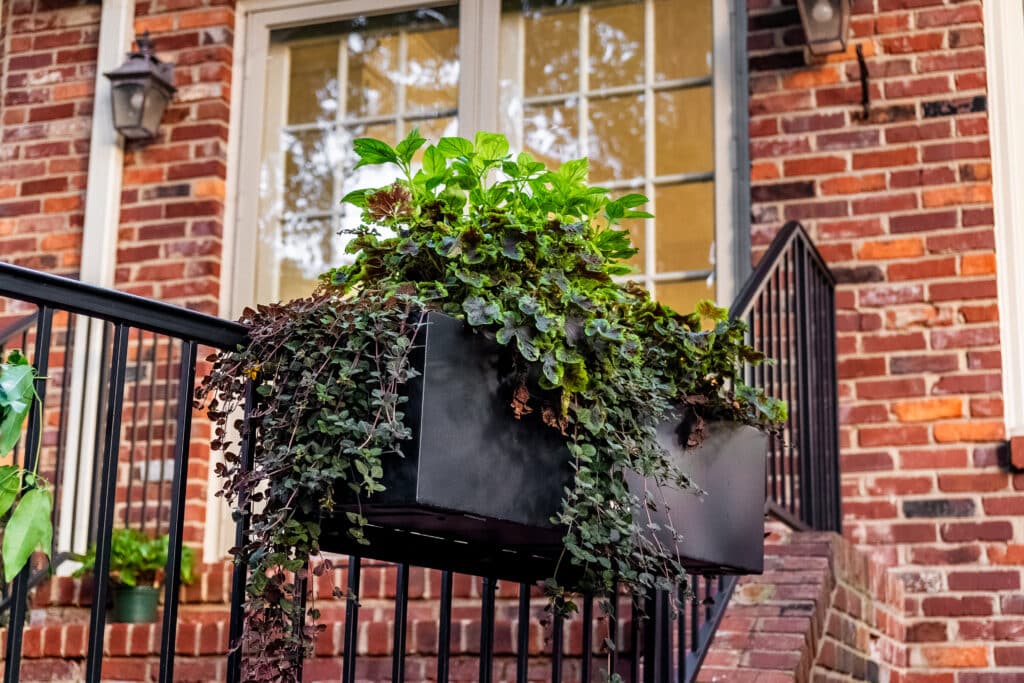
3. No patio or balcony roofing? Say hello to balcony boxes and window boxes.
Both are great options if you have absolutely no outdoor green space. You can drill them onto your balcony or porch railing or right under your window. (If you rent or lease your property, check with your landlord before drilling into spots like these.) There are also drill-free options with hooks that wrap over and around your railing. You’ll just want to keep an eye on them on extra windy days. You can even build your own box if you want a more unique look, or if you want a fun afternoon project!
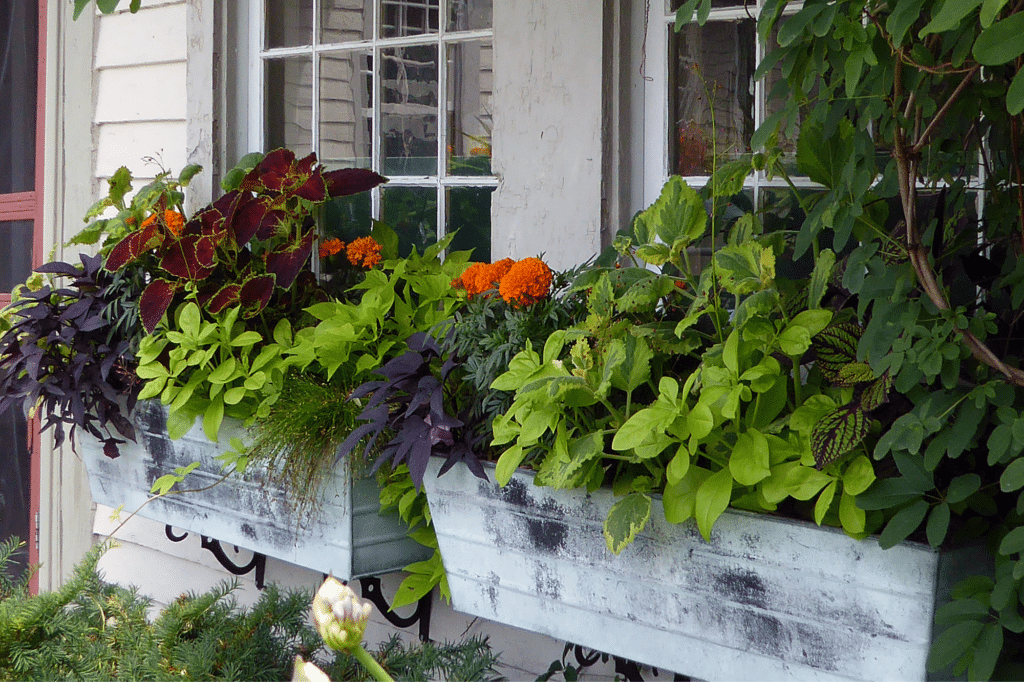
Some of our balcony/window box suggestions: If you want something both beautiful and practical, you can use your balcony box as a small herb garden – think cilantro for your homemade salsa or as a garnish for your taco Tuesday. Not to mention some fresh mint for the mojitos that would pair so well with both your salsa and tacos! Not feeling the herb love but would love to utilize other edible plants? Check out our edible plants blog post here. You can also use our other suggestions from potted plants and hanging baskets when it comes to these boxes (except trees, of course).
Having limited space outside doesn’t mean you can’t have beautiful outdoor spaces. It just means you might have to be more creative with how you curate those spaces, and we’re all about getting creative here at Gardens of Babylon! So be sure to come see us at the garden center to get the perfect plants for your new outdoor space. Or schedule with one of our designers to have us bring your vision to life!























